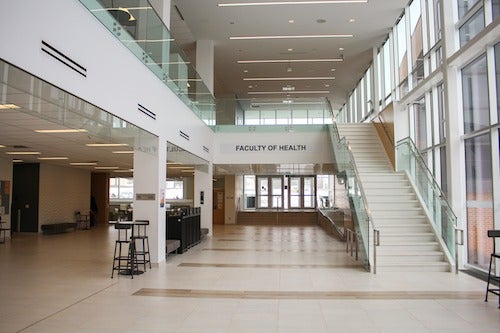- In-person campus tours return, with Virtual Open House on March 19
- Q and A with the experts: war and the threat to Canada
- AHS building code changing to EXP in Quest this week
- Homelessness research "mash up" event coming later this month
- Grab a virtual slice at the Annual Dean's Lecture on Pi Day
- Friday's notes
Editor:
Brandon Sweet
University Communications
bulletin@uwaterloo.ca
In-person campus tours return, with Virtual Open House on March 19

A message from Marketing and Undergraduate Recruitment.
We're excited to have in-person tours back in full swing, with 1,300+ guests registered to tour campus, faculties, and colleges during March Break, which runs from March 14 to 18.
Tours are operating out of Fed Hall for the week to accommodate the increased number of visitors wanting to visit campus during their school break.
Finishing off the week, prospective students may register for the March Virtual Open House (MVOH), which will be held on Saturday March 19, from 9 a.m. to 1:30 p.m.
The MVOH will allow prospective students from around the world to learn more about Waterloo’s varied programs and services, and to connect with professors, staff and students who will be on hand during the event.
Attendees will have the chance to sit in on presentations, join virtual campus and residence tours, ask questions through live chat, watch videos, and download brochures.
If you know a university-bound student, invite them to register.
Q and A with the experts: war and the threat to Canada

The University of Waterloo has a number of experts available to speak about the issues of the day.

Once-peaceful neighbours Ukraine and Russia find themselves in an eight-year-long conflict culminating in a bloody full-scale invasion by Russian forces. University of Waterloo political scientist Veronica Kitchen answers questions about which security issues Canadians should be worried about given recent events in Europe and the United States.
Canada is very proximate to Russia through the Arctic. Does Russia pose a threat to Canadian territory?
Canada’s Arctic is key to Canadian defence and has been since Russia developed the capability, during the Cold War, to fly bombers and launch long-range missiles over the North Pole. A threat to the North is a threat to Canadian sovereignty and a threat to the security of the primarily indigenous population across the Arctic, in Canada and beyond. The Arctic Council, which is the governing body that cooperates on issues like environmental protection and the wellbeing of Arctic Indigenous people, was suspended after the Russian invasion of Ukraine. That makes it harder to ensure human security.
A military threat to Canada from Russia would be most likely if the war escalates to include NATO members in direct conflict. A military strike could be used as direct retaliation against Canada, or the explicit threat of one could be used to try to influence Canadian foreign policy in Ukraine. Canada cooperates with the United States to secure the Arctic through NORAD, but there are some questions about whether the existing defences are sufficient to protect North America.
Does our relationship with the USA help our security?
Canada benefits from its partnership with the United States for its defences against threats from outside of North America, for example, through NORAD and responding to environmental catastrophes that might cross borders. In this sense, North American security is indivisible. If Canada doesn’t have a strong security relationship with the United States, it can lose influence at the table where the future of its own defence is decided.
Recently we’ve seen calls from populist American politicians for the liberation of Canada. Should that concern us?
An invasion by American government forces is not something that keeps me up at night. We would have very strong signals—probably over a long period—about the deterioration of Canada-US relations, and it would probably be accompanied by big global shifts like the dissolution of NATO. In the short term, the invasion of Ukraine might trigger a renewed strength in NATO as its members seek to shore up defences of member states in Europe.
But this rhetoric is dangerous nonetheless because it sends a signal to extremists in both countries who might use the rhetoric as an excuse to commit violence in both countries in the name of ‘liberation’, as we saw in the January 2021 attacks on the US Capitol, or the trucker convoy occupation of Ottawa. We know that Russia has sought to use misinformation to exploit social divisions in Canada and the United States to influence elections. So, right-wing extremism in North America and Russian rhetoric of liberation and national greatness are not so disconnected.
Why do you think this invasion has captured our attention? Given our relational similarities, do Canadians see themselves in Ukrainians?
There are many reasons why Canadians feel an affinity for Ukrainians in this situation. Canada has the largest population of Ukrainians outside of Ukraine and Russia. Ukrainian food and culture are mainstream in many parts of the country. Our Deputy Prime Minister, Chrystia Freeland, is a Ukrainian-Canadian with a dissident past who can reassure Ukrainians of Canadian support in Ukrainian and tell off Russia in Russian. Those are powerful links. But it’s impossible to deny the racism that has underpinned calls for support of Ukraine, suggesting that Ukrainians deserve support because they are white Europeans.
Acknowledging that racism doesn’t take away from Ukrainian suffering or calls to Canadian action. But it should remind us that war and violence happen around the world and that there are non-white Canadians who are noticing the big and emotional response this time and feeling like more could have been done to help their families when they fled violence. Politics will always shape how the Canadian government responds to any crisis or conflict. But there are tools that are becoming standard practice in a crisis like this—such as creating a hotline, waiving visa requirements, expediting refugee processes, and matching donations—that should be developed and institutionalized so that they can be implemented quickly in response to need, rather than to emotion.
Veronica M. Kitchen is an Associate Professor of Political Science at the University of Waterloo and in the Balsillie School of International Affairs. Her research is primarily on national security in a Canadian context, from the perspective of critical and feminist security studies.
AHS building code changing to EXP in Quest this week

A message from the Faculty of Health.
Quest and the Schedule of Classes have been updated this week to reflect the change in name from what was known as the AHS Expansion building (AHS) to what is now the Health Expansion building (EXP). Students and instructors can expect to see that update on these systems, and there is temporary signage on the building’s doors in case there is confusion.
The change is taking place now so that Quest and the Schedule of Classes are accurate for the spring term. It follows the overall Faculty name change last year from Applied Health Sciences to the Faculty of Health, which was one of the recommendations that came out of the Faculty’s 2020-25 Strategic Plan.
Homelessness research "mash up" event coming later this month

A message from Community Relations and Events.
Mid-sized communities (including the Waterloo Region, London, and Hamilton) are experiencing new pressures related to the needs of individuals and families. The urgency of these issues has been underscored by the impacts of the pandemic. Altogether, this represents critical new opportunities for community-based research. The University of Waterloo is partnering with the Region of Waterloo to ignite and invest in new research initiatives related to these urgent and emergent issues identified by our community.
An interdisciplinary mash-up will be held on March 24, 2022 where interested researchers and grad students from all faculties across the University can learn more about the opportunity, speak with Region of Waterloo and not-for-profit stakeholders, and engage in break-out discussions on the three thematic areas to spark collaboration and connection, leading to applications for funding.
Following the event, participants will have six weeks to complete an application that will be reviewed by UW and the Region of Waterloo, and two projects will be selected to receive $25,000 each. Starting in August 2022, research projects will run for one year, culminating in a report, including policy recommendations for the Region of Waterloo, as well as a 2023 Knowledge Mobilization event with stakeholders. Interdisciplinary collaboration is encouraged but not required.
Research will address one or more of the following thematic areas, focusing geographically on Waterloo Region:
- Perceptions of currently unhoused population
- Alternative options for currently unhoused individuals in Waterloo Region
- Prevention of youth homelessness
Register for the mash-up session
Registration for the March 24, 2022 mash up is required, and an online link will be provided to you in advance. Register here by March 14. For further information, please contact Kelly McManus, Senior Director, Community Relations & Events.
Grab a virtual slice at the Annual Dean's Lecture on Pi Day

Celebrate Pi Day on Monday, March 14 with an exclusive update and conversation about how the University of Waterloo is positioning itself to play an important role in meeting the world's current and future health challenges with Dean of the Faculty of Mathematics Mark Giesbrecht. The event will be held on Monday at 8:00 a.m. ET to take into account the time difference.
The Dean will showcase the vision for the Faculty and its commitment to Waterloo's international alumni, especially those in Hong Kong and the surrounding area.
“Mathematics that cure us”, a lecture exploring the roles mathematics can play in drug discovery and development and in our ongoing health will be delivered by Dr. Anita Layton, Canada 150 Research Chair in Mathematical Biology and Medicine, and Professor of Applied Mathematics, Computer Science, Pharmacy and Biology at the University of Waterloo.
"SARS-CoV-2, the virus that causes COVID-19, was first identified in December 2019," says the talk's abstract. "By December 11, 2020, the Pfizer vaccine became the first to receive emergency use authorization from the Food and Drug Administration. Creating a vaccine in under a year is no small feat. While the coronavirus pandemic made a new normal of mask-wearing and physical distancing, it showcased the crucial role of vaccine research. What roles can mathematics play in drug discovery and development—and in keeping us healthy?"
Follow along on social media with #DeansLectureHK.
Pi Day is traditionally celebrated at Waterloo beginning at 1:59 p.m. and concluding at 3:59 p.m. Keep tabs on the Pi Day countdown online and grab yourself some pie to join in the virtual celebration.
Friday's notes

The Writing and Communication Centre is excited to announce the return of in-person appointments. "Beginning on March 14, when booking your appointment with us, you have the option to choose an in-person or a virtual appointment with most advisors," says a note from the WCC. "Please note that some advisors are continuing with virtual appointments only." More information is available on the WCC website.

The Concept $5K semi-finals are fast approaching. The Concept $5K pitch competition offers the opportunity for University of Waterloo student led teams with innovative solutions and high potential business ideas to showcase their hard work and compete for grant funding. The two semi-final events are scheduled as follows:
- Night 1, March 16: https://concept.uwaterloo.ca/event/concept-5k-semi-finals/
- Night 2, March 17: https://concept.uwaterloo.ca/event/2022-03-17/
More information is available on the Concept website. This term's Concept Finals are scheduled to take place on March 31.
Beyond the Bulletin Episode 119

After a three-week break, the latest episode of the Beyond the Bulletin podcast is now live. Just back from her first Olympic Games, first-year planning student Madeline Schizas discusses balancing world-class figure skating and her studies. The University shares support for the people of Ukraine. As Ontario moves to reopen, some safety measures remain in place at Waterloo for now while others change. And registration is open for both the staff conference and the teaching and learning conference.
Link of the day
When and Where to get support
Students can visit the Student Success Office online for supports including academic development, international student resources, immigration consulting, leadership development, exchange and study abroad, and opportunities to get involved.
Instructors looking for targeted support for developing online components for blended learning courses, transitioning remote to fully online courses, revising current online courses, and more please visit Agile Development | Centre for Extended Learning | University of Waterloo (uwaterloo.ca).
Instructors can visit the Keep Learning website to get support on adapting their teaching and learning plans for an online environment.
Course templates are available within your course in LEARN to help you build and edit your content and assignment pages quickly.
The following workshops, webinars, and events are offered by the KL team (CTE, CEL, ITMS, LIB):
- Independent Remote Course Design Essentials, self-directed, continuous self-enrollment course in LEARN.
- Independent Blended Course Design (iBlend), self-directed, ongoing
- Copyright Overview for Waterloo Instructors and Staff - self-directed, continuous self-enrollment course in LEARN.
Supports are available for employees returning to campus. Visit IST’s Hybrid Work and Technology guidelines and workplace protocols to assist with the transition.
The Writing and Communication Centre has virtual services and programs to help undergrads, grad students, postdocs and faculty members with academic writing.
- Meet with writing advisors in one-to-one appointments to brainstorm, draft, revise, and polish. No time for an appointment? Try email tutoring for undergrads.
- Beat isolation and make writing progress at weekly Virtual Writing Cafés for grad students and faculty or PJ-Friendly Writing Groups for Undergrads.
- Take an online workshop or apply to our popular Dissertation Boot Camp program.
- Faculty can request custom in-class workshops for their courses, or the WCC can facilitate any existing workshops for student groups.
- Course-integrated support available. Attention faculty and instructors: The application form for Writing and Communication Centre course-integrated support is now available online. We offer five unique support streams for your courses including synchronous and asynchronous workshops and monitored discussion boards.
Co-op students can get help finding a job and find supports to successfully work remotely, develop new skills, access wellness and career information, and contact a co-op or career advisor.
The Centre for Career Action (CCA) has virtual services and programs to support undergrads, grad students, postdocs, alumni and employees in figuring out what they value, what they’re good at, and how to access meaningful work, co-op, volunteer, or graduate/professional school opportunities. Questions about CCA's services? Live chat, call 519-888-4047, or stop by our front desk in the Tatham Centre between 8:30 a.m. and 4:30 p.m. EST, Monday to Friday.
Drop-in to Warrior Virtual Study Halls on Wednesdays from 5:30 p.m. to 7:00 p.m. Come together in this virtual space to set goals and work independently or in groups each week.
Renison's English Language Institute continues to offer virtual events and workshops to help students practice their English language skills.
If you feel overwhelmed or anxious and need to talk to somebody, please contact the University’s Campus Wellness services, either Health Services or Counselling Services. You can also contact the University's Centre for Mental Health Research and Treatment. Good2Talk is a post-secondary student helpline available to all students.
The Library is open with expanded hours for access to book stacks, drop-in individual study space, bookable group study rooms, drop-in access to computers and printers, book pick-up services and IST Help Desk support. Librarian consultations, Special Collections & Archives and the Geospatial Centre are available by appointment. Full details on current services and hours are available on the Library’s COVID-19 Update webpage.
The Faculty Association of the University of Waterloo (FAUW) continues to advocate for its members. Check out the FAUW blog for more information.
The University of Waterloo Staff Association (UWSA) continues to advocate for its members. Check out the UWSA blog for more information.
The Sexual Violence Prevention and Response Office (SVPRO) supports all members of the University of Waterloo campus community who have experienced, or been impacted, by sexual violence. This includes all students, staff, faculty and visitors on the main campus, the satellite campuses, and at the affiliated and federated Waterloo Institutes and Colleges. For support, email: svpro@uwaterloo.ca or visit the SVPRO website.
The Office of Indigenous Relations is a central hub that provides guidance, support, and resources to all Indigenous and non-Indigenous campus community members and oversees the University's Indigenization strategy.
The Waterloo Indigenous Student Centre, based at St. Paul’s University College, provides support and resources for Indigenous students, and educational outreach programs for the broader community, including lectures, and events.
WUSA supports for students:
Peer support - MATES, Glow Centre, RAISE, Women’s Centre - Visit https://wusa.ca/peersupport to book an appointment either in person or online for the Fall term.
Food Support Service food hampers are currently available from the Turnkey Desk 24/7 in the Student Life Centre. Drop off locations are also open again in SLC, DC, DP, SCH and all residences.
Co-op Connection all available online. Check https://wusa.ca for more details.
Centre for Academic Policy Support - CAPS is here to assist Waterloo undergraduates throughout their experience in navigating academic policy in the instances of filing petitions, grievances and appeals. Please contact them at caps@wusa.ca. More information is available.
WUSA Student Legal Protection Program- Seeking legal counsel can be intimidating, especially if it’s your first time facing a legal issue. The legal assistance helpline provides quick access to legal advice in any area of law, including criminal. Just call 1-833-202-4571.
Empower Me is a confidential mental health and wellness service that connects students with qualified counsellors 24/7. They can be reached at 1-833-628-5589.
GSA-UW supports for graduate students:
The Graduate Student Association (GSA-UW) supports students’ academic and social experience and promotes their well-being.
Advising and Support - The GSA advises graduate students experiencing challenges and can help with navigating university policies & filing a grievance, appeal, or petition.
Mental Health covered by the Health Plan - The GSA Health Plan now has an 80 per cent coverage rate (up to $800/year) for Mental Health Practitioners. Your plan includes coverage for psychologists, registered social workers, psychotherapists, and clinical counselors.
Dental Care - The GSA Dental Plan covers 60 to 70 per cent of your dental costs and by visiting dental professionals who are members of the Studentcare Networks, you can receive an additional 20 to 30 per cent coverage.
Student Legal Protection Program - Your GSA fees give you access to unlimited legal advice, accessible via a toll-free helpline: +1-833-202-4571. This advice covers topics including housing disputes, employment disputes, and disputes with an academic institution.
The Graduate House: Open Monday to Friday 11:30 a.m. to 6:00 p.m. We’re open to all students, faculty, staff, and community members. The Graduate House is a community space run by the GSA-UW. Vaccination Records and Government ID continue to be required for all dine-in guests. Graduate students who paid their fees can get discounts and free coffee.
When and Where (but mostly when)
Warriors vs. Laurier Blood Donation Battle. Join our “Waterloo Warriors” team on the Blood.ca website or app. #ItsInYouToGive
Half Price Fitness Memberships and Rock Climbing Memberships. Only $25 for the remainder of the term. Purchase your membership now.
Y Combinator Spring Tour at University of Waterloo, Friday, March 11.
Day of Action for a Just Transition, Saturday, March 12, 2:00 p.m., in the Huron Natural Area.
Warriors Women’s Hockey OUA Quarter-Finals vs. TBD, Saturday, March 12, 2:30 p.m. (CIF Arena). Purchase your tickets today.
Warriors Basketball vs. Lakehead, Saturday, March 12, 6:00 p.m. and 8:00 p.m. Senior Day, Youth Camps and Minor League Day, Fantastic Alumni, Faculty, Staff and Retirees Day. Free tickets available for youth basketball players, alumni, faculty staff and retirees. Purchase tickets today.
Men's Hockey vs. Laurier, Saturday, March 12, 7:00 p.m. Battle of Waterloo, Senior Day. Purchase your tickets today.
Blend 2022 – Where Business Meets Design, presented by The Stratford School of Interaction Design and Business and Manulife, exploring the theme "Design for All." Saturday, March 12, 12:00 p.m. to Sunday, March 13 at 6:00 p.m.
FAUW seminar, Applying for Tenure, Monday, March 14, 10:30 a.m.
NEW - Annual Dean’s Lecture in Hong Kong & Pi Day Celebration, Monday, March 14, 8:00 p.m. HKT (8:00 a.m. ET)
Getting Ready to Facilitate Online Courses: TA Training – Spring 2022, March 21 to April 15 (online certificate course). Register on GoSignMeUp.